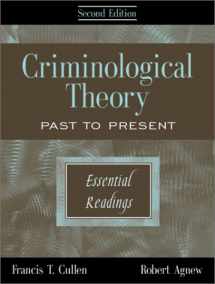
Criminological Theory: Past to Present (Essential Readings)
Book details
Summary
Description
Roxbury is pleased to announce the publication of the Second Edition of Cullen and Agnews popular and acclaimed CRIMINOLOGICAL THEORY: Past to Present (Essential Readings). This comprehensive anthology takes readers on an excursion from "past to present," reviewing classic and contemporary contributions and showing how current theories are opening new and exciting doorways into understanding crime. Students are introduced to the foundations of criminology and the competing theories that will shape thinking about crime in the years ahead.
The new edition includes 14 new selections, ranging from classic works by Beccario and Reckless to recent selections on social disorganization, deterrence, critical, and control balance theories. Two new sections have been added: "The Origins of Modern Criminology" and "Developmental Theories: Crime and the Life Course." Many of the other sections have been substantially revised. The section on biological and psychological theories, for example, now includes recent work by Ellis, Walsh, Rowe, Caspi, Moffitt, Brennan, Raine, and others.
New introductory essays provide overviews of the different theories and perspectives and their relationship to one another. The reader is divided into twelve sections, each covering a major theoretical approach to the study of crime. Each section begins with a classic statement of the theoretical approach, after which selections from contemporary theories are presented. This eases instruction because students are able to trace how criminological thinking developswitnessing how scholars "stand on the shoulders of the giants" in the field to see differently, if not farther.
Each individual reading offers an introduction that alerts readers to key points and integrates the selection into the larger themes of the section. These introductions serve as a useful "road map" as students travel through the ongoing intellectual developments, diverse views, and continuing debates that make the study of criminological theory an exciting adventure.
Francis T. Cullen is Distinguished Research Professor in the Department of Criminal Justice at the University of Cincinnati. He received his Ph.D. in 1979 from Columbia University. He is the author of Rethinking Crime and Deviance Theory: The Emergence of a Structuring Tradition, coauthor of Criminological Theory: Context and Consequences, and coeditor of Contemporary Criminological Theory. He is past president of the Academy of Criminal Justice Sciences and former editor of Justice Quarterly.
Robert Agnew is a Professor in the Department of Sociology at Emory University. He received his Ph.D. in 1980 from the University of North Carolina at Chapel Hill. He has published widely in the area of criminology, including his books, The Future of Anomie Theory and Juvenile Delinquency: Causes and Control. He is most noted for his development of "general strain theory," a perspective that is attracting considerable theoretical and empirical attention. Agnew is past president of the Georgia Sociological Association and has served on the editorial boards of the journals, Criminology and Social Forces.


We would LOVE it if you could help us and other readers by reviewing the book
Book review



